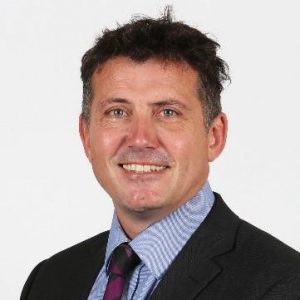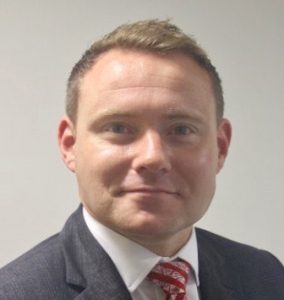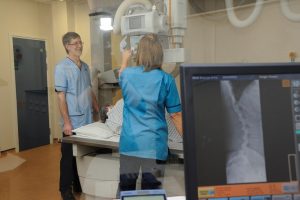Brighton and Hove health chiefs have promised that patients who need face to face appointments with their family doctor will still be seen in person.
The reassurance came as Brighton GP (general practitioner) Andrew Hodson spoke about the measures taken to keep patients, clinicians and others safe since the start of the coronavirus pandemic.
These include greater use of telephone and video consultations with family doctors as well as more use of triage or screening.
Some of these changes have been welcomed by patients although not by all, a survey by Healthwatch found, with patients wanting choice as well as safety.
But the use of remote consultations looks likely to form a key part of the offer from doctors’ surgeries in the future – regardless of covid-19.
Dr Hodson, the clinical chair of the Brighton and Hove Clinical Commissioning Group (CCG), said: “We will continue to offer face-to-face appointments. We know the worth of that personal contact with patients.
“In future there will be some differences in the way we (GPs) work but we are certainly open for business and patients who need face-to-face appointments will get them.”
He told the CCG’s “virtual” AGM (annual general meeting) on Tuesday (15 September): “It’s been a year like no other.
“I want to share my sincere thanks to everybody across the health and care system in Brighton and Hove – and beyond – for all their incredible work in the response to covid-19.
“It’s been the most acute challenge to the NHS since its inception in 1948 that we’ve all had to face.
“And I have to say that the resolve – and I’ve seen it first hand – the resolve and commitment of the staff within the CCG, with the clinical staff across the system – and broader as well – and carers, patients and everybody … the resolve across Brighton and Hove has been incredible really.
“Within that, I would of course include patients. Patients have had to face the uncertainty, worry and anxiety around covid-19.
“Patients have been overwhelmingly supportive and kind and have really shown their appreciation of NHS and wider system staff – and I just wanted to thank them as well.

“We know there’s a lot of hard work to do to restore our services in the safest way possible – because we’re still in the middle of a pandemic – and I know that all of our teams are dedicated to doing this.”
He praised the partnership working across the health and care sectors in Brighton and Hove and added: “I am very proud of how everyone has pulled together and all that has been achieved since March.”
CGC chief executive Adam Doyle said: “This year has been like no other I can ever remember in the NHS.”
The GP-led CCG, made up of 35 practices, was responsible fas or commissioning healthcare services for almost 300,000 people in Brighton and Hove.
Mr Doyle said that it had kept to its £456 million budget which it spent buying healthcare for the local population.
Almost half of the budget – £207 million – was spent on hospital care, most of it going to Brighton and Sussex University Hospitals NHS Trust, which runs the Royal Sussex County Hospital and the Royal Alexandra Children’s Hospital.
The CCG also spent £60 million on mental health services, £56 million on primary care and £41 million on community health services.

Mr Doyle said that the CCG had made savings of £10 million in the financial year to the end of March from “system efficiencies” and better medicines management.
Spending on prescribing was £37 million, with staff shortlisted for a national award for their work in pharmacies and medicines optimisation.
Their work to tackle “inappropriate prescribing of adult oral nutritional supplements” was said to have saved a six-figure sum while improving patients’ care and health.
The past year, Mr Doyle said, had seen barriers breaking down between commissioning organisations – like the CCG – and provider organisations such as hospitals and family doctors.
The Sussex Health and Care Partnership had brought together several organisations to become, from May, an integrated care system (ICS).
The aims, he said, included ensuring that organisations worked together more efficiently to provide joined up services.
They also included decision-making at the right level and scale to provide services that were better suited to people’s individual needs.
Mr Doyle said that areas where improvements had been made – or were being made – included waiting times at the Royal Sussex A&E (Accident and Emergency) Department.
He said: “Performance against the four-hour wait target at A&E continues to be a challenge with 78.2 per cent of patients being seen within four hours.”
The target set by the government is 95 per cent.
Patients referred for specialist treatment are still having to wait longer than the 18-week target and Mr Doyle said that “recovery plans” had been put in place.
He added: “Demand remains particularly high for some specialties including digestive diseases, neurology and ophthalmology.”
Cancer diagnosis and treatment had also presented challenges and he said: “We continue to seek a very high level of performance as a priority to ensure all cancer patients receive the care they need in the quickest possible way, in particular, ensuring there is sufficient capacity in diagnostics.”
A number of hospital trusts have struggled to recruit enough radiographers and sonographers – ultrasound specialists – who have a crucial role in diagnostics including cancer testing.
Mr Doyle said that mental health services were also a focus and the CCG was working in partnership with Brighton and Hove City Council in this area.
The CCG was looking at ways to speed up the hospital discharge process, reduce the need for ambulance crews to take patients to hospital and continue to get better at diagnosing dementia.
Healthwatch Brighton and Hove – and others – provided valuable feedback and among the “key areas of engagement” were audiology, hospital discharge and online GP consultations.









